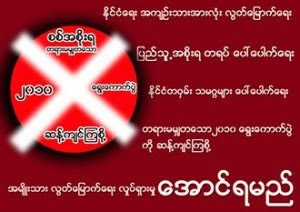က်ြန္မရဲ႕ ျမန္မာျပည္မွာ ေစ်းကြက္စီးပြားေရးမေအာင္ျမင္ရတာလဲ ေဆာင္းပါးနဲ႔ ပတ္သက္ျပီး၊ ဘားမားကင္ ဆိုသူက ကိုမိုးသီးဇြန္ ဘေလာ့မွာ က်ြန္မေရးသားထားတဲ့အခ်က္မ်ား မွားယြင္းေနပါတယ္ဆိုျပီး ဆိုလာပါတယ္။ ဒါနဲ႕ ပတ္သက္ျပီး၊ က်ြန္မဘက္က ျပန္ argue လုပ္ထားတဲ့ အခ်က္မ်ားကို ေအာက္မွာ ေဖာ္ျပထားပါတယ္။
These are my arguments for Burmakin’s statements.
(1)As the government has no capacity to do the competitive market, the market economy is not successful. (Khin Ma Ma Myo)
Burmakin: The State should have the minimal intervention in the market economy(Conservative market theory).The efficiency of a market is more operational when the State keeps away from it rather than the State tries to do something for it.
Khin Ma Ma Myo: For this point, I did not mention the government has no capacity to do the competitive market. The point I mentioned was about the market-facilitating legal and economic practices in
(2)Bribery makes the market economy difficult to operate. (Khin Ma Ma Myo)
Burmakin: Bribery can promote the economics by greasing (smoothing) the bureaucratic transactions. Even in
Khin Ma Ma Myo: I did not mention that the countries must not have substantial corruption. I agreed the point that even East Asian countries have a substantial level of corruption. However, the control of corruption is one of the governance matters for developing a market economy. According to the recent World Bank Research, the control of corruption grade for
Moreover, the fact you mentioned about the relationship between bribery and bureaucratic transactions have two conflicting results and you pointed only one dimension. According to the empirical results, the failure of bureaucrat 1 to internalize the bribe externality under decentralization, in effect colluding with the investor to hold back price against the interests of bureaucrat 2, is beneficial to the domestic economy. At the same time, the failure of each bureaucrat to internalize the price externality under decentralization has a positive effect on price, and this is damaging to the domestic economy. So the net result of these two conflicting effects is that either centralization or decentralization may yield the higher domestic welfare. So it cannot be totally assumed that bribery can promote the economies.
Regarding to the rent behavior, if you want to argue that government employee may have this behavior that lead to competition and innovation, please look at the following excerpt related to Nepalese society by development economist.
“Corruption is a rule in government offices and every government employee is rent seeker in
Even for the
So it is obvious that bribery can have a negative impact for economic growth and efficient operations of the market economy.
(3)Monopolistic control of the market by the military and military relatives make the market economy a complete moribund (Khin Ma Ma Myo)
Burmakin: There are two economic models still debating in the world since long time ago. The first one is the East Asian model like Singapore and China who try to legitimize the autocratic control of the market.(Learn Lee thesis please)In this East Asian model, the State will decide first who will control the market and they think when the first tier firms are performing well, the second,third tiers will follow.
Another model is the capability model that
Khin Ma Ma Myo: They are a lot of economic models still debating in the world related to welfare, environment, trade and so on, not only these two models.
Regarding to East Asian Development model, a large part of debates center on the role of the state on economic development of
For capability model, the focus is on competitive market. In fact, the essence of market economy is competitiveness, not autocratic control. Although you claimed that the efficiency of market is related to autocratic control, market efficiency does not merely mean high economic growth rates.
Furthermore, the monopolistic control of market by military and military relatives in
(4)Inflation makes the market economy worse (Khin Ma Ma Myo)
Burmakin: Inflation is an index for improvement in the rate of employment. It also makes the investors an incentive to add more investments. The debtors also need to pay back less because of inflation and more inclination to get a loan for new investments.( A good book for learning about inflation is "Stability and Growth" of Joseph Stiglitz)
Khin Ma Ma Myo: Actually, the rate of inflation measures the annual percentage increase in prices. Inflation tends to cause uncertainty among the business community. If it is difficult for firms to predict their costs and revenues, they will be discouraged from investing and it will reduce economic growth rate. Inflation also worsens the balance of payments. If one country suffers high inflation, its exports will become less competitive in the world markets. Imports will become cheaper than home-produced goods and balance of payments will be deteriorated.
Moreover, if inflation develops into hyperinflation, firms raise prices in attempt to cover rocketing costs, workers demand huge pay increases to cover high costs of living and prices and wages chase each other in an inflationary-spiral. As a result, the whole market economy will be undermined.
Concluding remark:
Burmakin: The main problem of the delay in economic development(you can't say economic failure here)is because there is minimal foreign investment that is the most important booster for progressing the country. For minimizing the disparity, the government has to do the fair distributive resource allocation from the tax revenues. Also he needs to invest in health and education for producing vigorous human resources. The main economic problems of
Khin Ma Ma Myo:
I agree the role of Foreign Direct Investment as an important booster for the progress the country. However, it depends on the condition of the host country government’s policy objectives. If the government is only interested in arms racing rather than economic development, the benefits of FDI will definitely increase the military balances but not the economy.
For minimizing disparities, fair redistributive strategies must be adopted. The size distribution at the upper levels must be reduced through progressive income and wealth taxes and the size distribution at the lower levels must be increased through direct transfer payments and public provision of goods and services. Does the SPDC have a suitable tax system for this?
For human capital investment, health and education sectors must be emphasized as you mentioned.
However, the major economic problems arise in

































